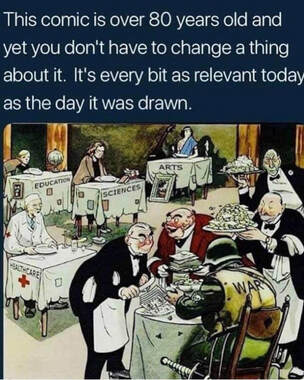
The end of the Cold War has not changed the deeply ingrained assumption that the future will look like the past. Is it really necessary to spend more than $750 billion a year to maintain a military ill-suited for the battlegrounds of the twenty-first century? We are unlikely to go to war with our nation-state adversaries—China and Iran. Chinese saber-rattling over Taiwan does not mean that the U.S. would recklessly confront China militarily in its own backyard. Similarly, Iran’s inching closer to possessing nuclear weapons, a regrettable outcome of Donald Trump’s imprudent trashing of the Iran nuclear agreement, won’t lead to a war against a regional military power on its home turf 6,500 miles away. Moreover, the havoc Iran could wreak on tankers transporting Middle Eastern oil through the Persian Gulf, which would do incalculable economic damage to Western economies, would give us pause.
Our annual defense budgets invariably include absurdly expensive programs and weapons that are at best unnecessary and all-too-often unusable The first proposed Biden defense budget has us spending more in 2021 dollars than we did in any year of the Vietnam War or the madcap defense spending spree of the Reagan era. This is nuts!
The U.S. spends more for defense than the next eleven big spending nations—China, India, Russia, United Kingdom, Saudi Arabia, Germany, France, Japan, South Korea, Italy, and Australia—combined. We have 20 aircraft carriers (a.k.a., sitting ducks); China has two; Russia one. We spend billions on high-tech planes that don’t work, like the snake-bitten F-35 Strikefighter, and on weapons that have proven ineffective in counter-insurgencies against rag-tag bunches of non-state actors like ISIS or the Taliban.
A more than adequate defense could be had for only a third of our current outlay. It would still be sufficient to deter any potential adversary. We could then redirect resources to the kinds of conflicts that represent the real threats to us—pandemics, climate change, domestic terrorists and income and wealth inequality.
Why do we blindly persist in gross overspending on defense, on focusing our planning on fighting improbable wars against nation-states, on being able to fight two-and-a half-front wars simultaneously, and on developing monumentally expensive weapons systems that are ineffective against the real external dangers we face? The answer is complex.
First, the cabal that President Eisenhower warned us against in his valedictory when he left office: “…we must guard against the acquisition of unwarranted influence…by the military-industrial complex. The potential for the disastrous rise of misplaced power exists and will persist.” More than 50,000 U.S. companies provide goods and services to the Department of Defense (DoD). They come from every congressional district and contribute millions of dollars to congressional campaigns.
Second, the rivalry between the armed services over budget money. The top minds in the Army, Navy and Air Force are not directed at our external enemies. Instead, they focus on their service rivals. I witnessed this personally during a decade as a DoD employee and consultant.
Third, the standard career path for retiring generals, admirals and other top brass is to move from DoD to the “Beltway Bandits,” the thousands of defense contractors willing to pay for easy access to their former DoD colleagues and members of Congress who control the purse strings.
Fourth, the fear of members of Congress of being labeled “soft on defense,” a worry especially felt by Democrats despite their mindless enthusiasm for excessive defense spending.
Fifth, the unraveling of the nuclear arms control agreements that prior presidents reached with the Soviets and their Russian successors that contributed to maintaining peace between the superpowers for so many years. Bipartisan support for them has eroded as the Republican Party has gone rogue, abandoning its suspicion of and hostility toward Russia, a price of currying favor with its Putin-admiring, autocratic cult leader, Donald Trump.
In sum, powerful economic and political interests overwhelm any rational assessment of our defense needs. The public needs to understand that we are wasting tax dollars on defense that could be applied to the crying needs of society that, if addressed, would go a long way to make this country stronger and more secure.
The performative hand-wringing by Senators Manchin and Sinema and others over the size of the human infrastructure bill currently before Congress is misplaced. Their real attention should be on the trillions we are going to squander on defense over the next ten years. Defense spending has too long been protected from the scrutiny it deserves. Changing the national conversation about it depends on the media and on voters armed with far better information about what is going on here. It is a very steep slope, but one very much worth ascending.
Dick Hermann
October 15, 2021


 RSS Feed
RSS Feed